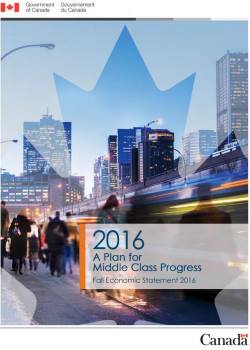
Highlights from Fall Economic Statement 2016
November 1, 2016
Finance Minister Bill Morneau today delivered the Government of Canada’s Fall Economic Statement. Below are some highlights of interest to the Canadian library and information management community:
Financial Information
Greater Clarity on Government Spending
Parliament’s current system of financial accountability is confusing and provides insufficient information to Parliamentarians and Canadians.
Under the Parliamentary budget cycle, the government tables two primary sets of financial planning documents: the Estimates and the budget.
The Estimates provide information on a subset of planned spending for the current fiscal year, and support the annual appropriation bills through which Parliamentary approval of spending is sought. This is presented on a cash accounting basis.
The budget, in contrast, is the document through which the government details the entirety of its revenue and spending plans for the current and, typically, five future years. This is presented on an accrual accounting basis.
Unfortunately, both the timing of the two documents and the differing scope and accounting methods mean that the Estimates cannot be easily compared to the budget. These issues, combined with an insufficient focus in the Estimates on programs and results, make it difficult for Parliamentarians to fully hold government to account when asked to vote on government spending.
Parliamentarians have voiced these concerns in the past. Most recently, a 2012 report of the House of Commons Standing Committee on Government Operations and Estimates recommended key changes to the Estimates process to improve transparency and relevance to Parliamentarians, for example, by better connecting the budget and Estimates documents.
To help make the process of reviewing government spending more open, transparent and accountable, the government proposes to implement reforms to the Estimates process over the next several years.
Specifically, the government will:
- Consult with Parliament to change the Standing Orders of the House of Commons, so that the tabling of the Main Estimates can take place on May 1st, rather than in early March; this will ensure that most budget initiatives can be included in the Main Estimates on which Parliamentarians will vote;
- Present cash accounting and accrual accounting reconciliation tables, so that Parliamentarians and Canadians can better understand federal government spending;
- Introduce several pilot projects aimed at delivering more “purpose-based” appropriations (at present, Parliamentarians vote on overall capital and operating budgets of federal departments; a shift to purpose-based appropriations will allow Parliamentarians to vote on particular purposes for proposed spending); and
- Change the Estimates process so that federal departments can update Reports on Plans and Priorities and Departmental Performance Reports (these accountability reports will be changed to better reflect budget initiatives, ensure they are focused on results and delivery, and provide more transparent reports on spending).
More Rigorous and Inclusive Analysis
To ensure that the government continues to deliver real and meaningful change for all Canadians, it will submit Budget 2017, and all future budgets, to more rigorous analysis by completing and publishing a gender-based analysis of budgetary measures.
Parliamentary Budget Officer
More Independence for the Parliamentary Budget Officer
Parliament needs access to information, resources and expertise so that it can best serve Canadians, more fully consider the financial and economic implications of the matters before it, and truly hold the government to account.
To enhance that access, the government will introduce new legislation to establish the Parliamentary Budget Officer as an independent Officer of Parliament, separate from the Library of Parliament. With these changes, the Parliamentary Budget Officer will serve Parliament with a renewed mandate to focus on costing and financial analysis of the federal government. Like other Officers of Parliament, the appointment will be based on merit and approved by Parliament, and the Parliamentary Budget Officer will only be removable for cause instead of serving at the pleasure of the sitting government.
As a servant of Parliament, the Parliamentary Budget Officer will report back to Parliament and Parliamentarians with research and analysis such as: costing requested by Parliamentarians; prescribed reports (for example, analysis of the federal budget or Estimates); and other research and analysis on costing and finances of the federal government.
The new legislation will also grant the Parliamentary Budget Officer greater access to relevant information held by departments and Crown corporations, balanced against necessary restrictions, such as protection of privacy, commercially sensitive information and issues of national security.
Finally, as exists in other jurisdictions, the Parliamentary Budget Officer’s mandate will include costing of platform proposals at the request of political parties to ensure Canadians have a credible non-partisan way to assess a party’s fiscal plans.
Statistics Canada
More Independence for the Chief Statistician of Canada
Statistics play an essential role in modern society. Statistics Canada’s open information platform is a vital tool to understanding ourselves, our past and our future. Canadians rely on the integrity and accuracy of this data in order to properly manage government services, improve social outcomes and facilitate business growth.
To ensure that Canadians continue to benefit from high-quality statistics produced in accordance with internationally recognized methods and standards, the government will introduce legislative amendments to the Statistics Actto reinforce the independence of Statistics Canada.
Specifically, the amendments will:
- Give the Chief Statistician of Canada decision-making authority on the procedures, methods and professional standards regarding content, timing and methods of statistical releases and publications;
- Appoint the Chief Statistician of Canada to a fixed five-year renewable term based on merit, only removable for cause and not at the pleasure of the government;
- Increase transparency around decisions and directives made by the government as they relate to Statistics Canada; and
- Replace the National Statistics Council with a newly created Canadian Statistics Advisory Council to reinforce independence, relevance and transparency in the national statistical system.
While the independence of the Chief Statistician of Canada has long been a matter of convention, these amendments will entrench in law the Chief Statistician’s independence from the government of the day. This will protect the integrity of Statistics Canada and the valuable information it provides.
Add a new comment